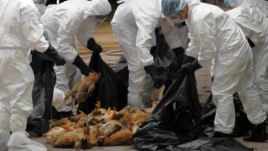當(dāng)前位置: Language Tips> VOA聽(tīng)力> Special Speed News VOA慢速
分享到
This is the VOA Special English Agriculture Report.
Researchers estimate that more than two billion people a year get diseases spread by animals. More than two million of them die.
Delia Grace is a veterinary epidemiologist -- an expert in the spread of diseases involving animals. She is also a food safety expert. She works at the International Livestock Research Institute in Nairobi, Kenya. She explains that diseases transmitted between animals and people are called zoonoses.

DELIA GRACE: "A majority of human diseases are actually zoonotic. More than 60 percent of human diseases are transmitted from other vertebrate animals. Some of these diseases are pretty common. Some of the food-borne diseases and also diseases such as tuberculosis, leptospirosis are not uncommon. Others are quite rare."
Delia Grace says there are many different infection pathways. Probably the most common one is for people to get sick from food. Other transmission pathways include direct contact with animals. And some diseases can be transmitted through water or through the air.
DELIA GRACE: "Diseases like avian influenza or mad cow disease have actually killed very few people. But they are of interest because some of them have the potential to kill a lot of people -- diseases like the Spanish flu after the First World War or HIV/AIDS, both of which were originally zoonoses."
Delia Grace is the lead author of a new report called "Mapping of Poverty and Likely Zoonoses Hotspots." She points out that poverty and disease are closely linked, so preventing the transmission of animal diseases could help reduce poverty.
The report, for Britain's Department for International Development, lists places where the diseases are most common. The report lists places where a disease has existed for a long time, a so-called endemic zoonosis, as well as places with new threats.
DELIA GRACE: "So in terms of the hotspots of the zoonosis which are there all the time -- not the new zoonosis, but what we call the endemic zoonosis -- we identified three countries which bear the greatest burden of these diseases. And those are India, Ethiopia and Nigeria. But in terms of the new diseases -- the diseases which haven't been there, but are emerging -- the hotspots are very different. They appear to be western United States and western Europe."
Delia Grace says things could get worse in the coming years as meat production increases to feed a growing world population. High production farms often raise animals close together. Crowding can allow diseases to spread quickly. Another concern is the use of antibiotics in food animals, not only to prevent and treat diseases but to increase growth.
The report says an "incentive-based" system to encourage safer methods of raising animals could be more effective than increasing food inspections. For example, small farmers could receive training and other help that would lead to official certification that their products are safe.
And that's the VOA Special English Agriculture Report. I'm Jim Tedder.
zoonosis: 人畜共患病
Bird flu virus found in poultry markets
Seeking a better way for African farmers to fight a Fever
Scientists continue their search for better treatments for multiple sclerosis – and a cure
Cattle plague declared eradicated
(來(lái)源:VOA 編輯:旭燕)
分享到
關(guān)注和訂閱


口語(yǔ)
關(guān)于我們 | 聯(lián)系方式 | 招聘信息
電話:8610-84883645
傳真:8610-84883500
Email: languagetips@chinadaily.com.cn